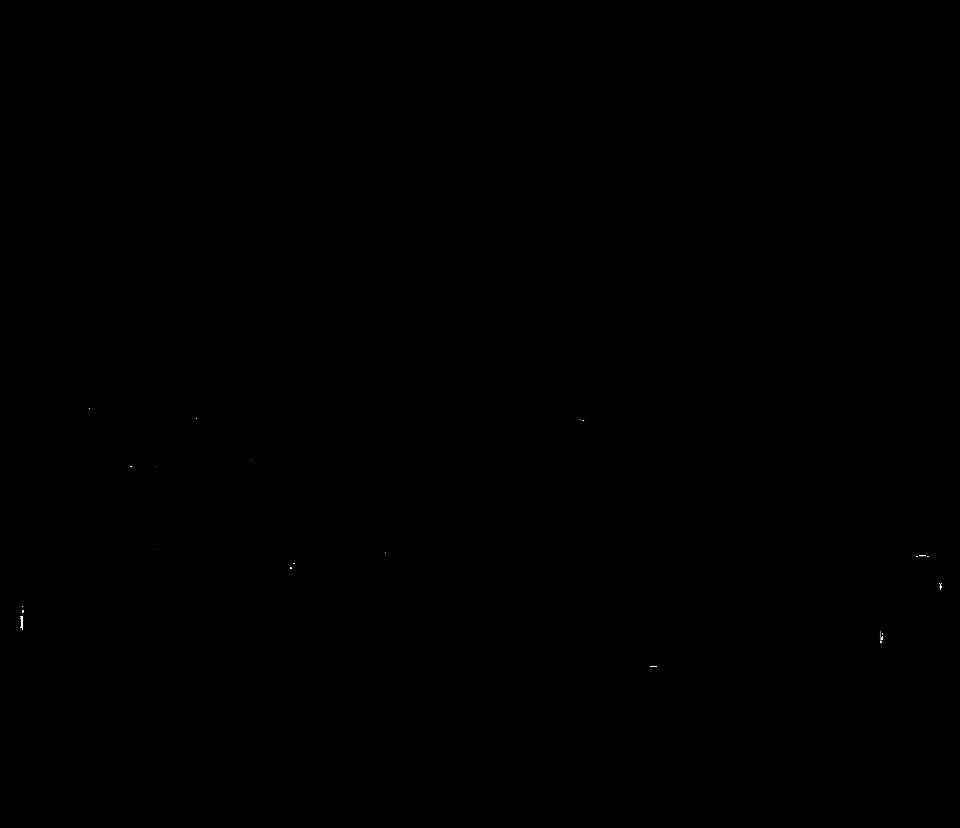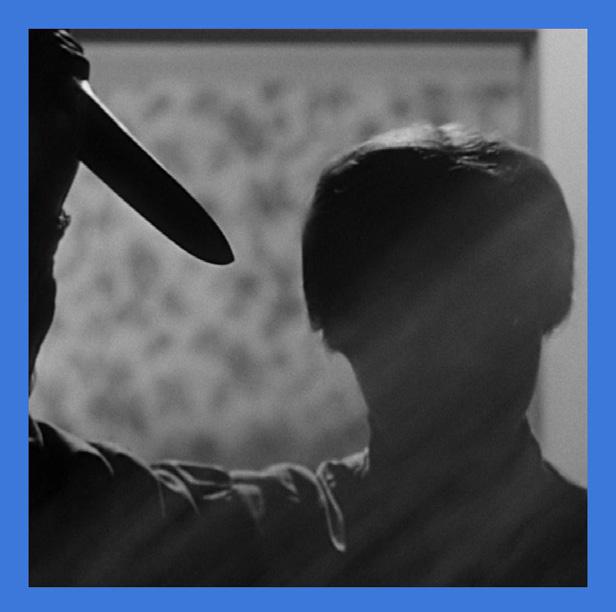MARS’ HILL
Canada after
struggle following disaster.
Pride and Prejudice andZombies The End Times
novel with genre-bending spooky fun.
Exploring the looming threat of climate change.

Communities
A
Pg. 5 Pg. 10 Pg. 12 Atlantic
Fiona Volume 27, Issue 3 10. 19. 2022. Scream
MARS’ HILL
Mars’ Hill is a student publication of Trinity Western University located on the traditional ancestral territory of the Stó:lō people. Floated with funds raised by the Student Association, Mars’ Hill seeks to be a professional and relevant student publication, reflecting and challenging the TWU community, while intentionally addressing local, national, and international issues
FROM THE EDITOR

“Be afraid. Be very afraid.”
That’s the tagline for David Cronenberg’s The Fly (1986). It is taken from a line in the film which, funnily enough, comedian Mel Brookes originally suggested to Cronenberg. It is a phrase that bounces around my head this time of year because it captures the sort of height ened fear that the Halloween season evokes.
Halloween is so fascinating as a holiday. It exists in a strange tension between the Christian and the pagan worlds with folk roots in both traditions. It partially stems from a celebration in the early church called “All Hallows’ Eve”— where we get the name—with elements of many Gaelic and Irish traditions thrown in. But in both Christian and pagan mindsets, the holiday is a time for magic and mystery, where the line between this world and the next begins to thin.
Nowadays, the “spooky season” brings images of jack-o’-lanterns, scary movies, and all sorts of monsters of the night. Some of us took the Halloween influences on this issue very literally. David Witzke writes about the novel Pride and Prejudice and Zombies, an interesting mashup of horror and romance, and Laura Witzke discusses the comforting murder mysteries of Agatha Christie. I took the opportunity to discuss a few of my favourite horror movies. Oth ers, however, took the theme of “Scream,” and its association with the word “fear,” in other directions. Hope Evans reports on the recent Hurricane Fiona disaster in Atlantic Canada and Berk Berkeliev writes about the ongoing war in Ukraine.

The world gives us lots to be fearful of, whether it’s the existential terror of climate change or a bad, aquatic date. We are so often afraid of what we do not know or can do nothing to pre vent. Maybe the early celebration of Halloween was born out of that fear of death, Hamlet’s “undiscovered country,” in order to tame it and make it personal. Although there are times when I want to give in to fear, I take comfort with the Psalmist: “I will fear no evil, for you [the Lord] are with me.” For those of us who are Christians, we have a hope that the hand of God will protect us, no matter how much we have to fear.
MISSION TO MARS
The mission of Mars’ Hill, as the official student newspaper of Trinity Western University, is to inform and entertain its readers, cultivate awareness of issues concerning the TWU community, and provide a forum for purposeful, constructive discussion among its members in accordance with the Community Covenant, Statement of Faith, and Core Values of the University.
EDITORIAL POLICY
Mars’ Hill encourages submissions and Letters to the Editor. Mars’ Hill reserves the right to edit submissions for style, brevity, and compatibility with the Mission, the Statement of Faith, the Student Handbook, and the Core Values of the University.
Anonymous authorship of any material may be granted at the discretion of the Editor-in-Chief. Opinions expressed in Mars’ Hill belong to the individual authors and do not necessarily reflect those of the editorial board, Trinity Western University, its officials or its Student Association.












1 THE TEAM
Seth Schouten Editor-in-Chief Ava Gili Cheif Copy Editor
David Witzke Arts & Culture Editor
Hope Evans News Editor
Juilianne Jones Sports Editor
Sadie McDonald Opinions Editor
Bailey Frose Humour Editor
Berk Berkeliev Staff Writer Diego Bascur Staff Writer
Jared Klassen Web Editor
Zaeya Winter Illustrator
Media Advisor Dr. Monika Hilder
Branding Design Simon Shackelford
Contributor of the Issue: Annika Boganes

Where are you from?
I am from Langley, BC
What’s your year and major?
I am a fourth-year History major
What’s been your favourite piece you’ve written for Mars’ Hill?
I really enjoyed the piece I wrote for the last issue about the election of Pierre Polievre. He is a polarizing figure in Canada right now and it will be very interesting to see if the political culture in Canada will change in the coming months.
What is something that excites you? Any activity in the mountains is amazing,
Cover Artist:
Zachary SimonyiGindele
“Beware the Jabberwock my son! The jaws that bite, the claws that catch! Beware the Jujube bird, and shun The frumious Bandersnatch!”
-Lewis Carroll
About Me:
whether it’s hiking up them in the summer or skiing down them in the winter.
What was the last thing you ate?
I had a rainbow salad with feta cheese and pumpkin seeds. This salad is just a mix of many different vegetables and I one of my favourite lunches.
What other things are you involved in across campus?
I am currently the Humanities representative on TWUSA and have really enjoyed being able to represent my faculty. I look forward to meeting more people and finding new ways to connect with all Humanities students.
WORDS FOR THE DAY
“stepping out into a field”
Lucas Smith
to gaze upon a sunset is to await the stars.
One gives way for many –sacrifice for all each placed –arrayed in symphony. impossible chaos ordered exactly
some claim names: Vela, Orion, Aries, Ara –formed for us in the beginning… the Cosmic Cathedral, grandeur beyond but here, Silence.
left standing mind detached floating with Andromeda tossed to Cassiopeia a discussion with Corvus battle against Draco humbled by Leo. descend –cool damp grass tear in eye, heart cries out

who am i so small cut at the heart –ministered by this orchestra here i am Lord.
Born in Canada and raised in Subsaharan Africa, I am an illustrator who currently lives and works in Vancouver, British Columbia. Both my background growing up and love of history help imbue my storytelling with a broad range of perspectives and experiences. I have an innordinate love for books, good food, and dry humour.
Zachary Simonyi-Gindele is in his last semester of TWU’s Art + Design program. He was the illustrator for Mars’ Hill volume 26.
CONTRIBUTORS & CREDITS

WRITERS
Annika Boganes David Buzza Michael E. Harlow & Alex Walker Lorin Sciano Lucas Smith Laura Witzke
PHOTOS
Kristian Trevena - pg. 1
Tomiwa Oyedokun - pg. 3
Jeff Gibbons/SAMC Theatre - pg. 4
John Morris/Reuters - pg. 5
Jim Huylebroek/New York Times - pg. 6
Spartans Athletics - pg. 7
11:07 Improv via Facebook - pg. 11
Markus Spiske - pg. 12 NASA - pg. 13
2
DECLASSIFIEDS

Too scared to ask out that hot girl from Rels class? Have a thought you’re dying to share? Did a professor say something strange or funny? Do you have some information that you want to get out to the student body? Whatever it is, the declassifieds are here for you.
Submit yours at www.marshillnewspaper.com/declassifieds
I vote fned should be the new TWU logo
Hailey Hrvatin is the bomb.
fned is the new egg???
Follow @fned.offical on instagram
All in favour of admitting that the word “responsibility” has too many “i”s, say “me”.
Patagonia CEO not selfless, saving $$$ on taxes using “climate change” as excuse
George Dumitrascu commits tax fraud
I dont think george is romanian. A man with that hair has to be kazak
“The brass players are saying “We Want Meat”” - Dr. Thorpe
Trinity trying to be like a small European town with all the bells but really they’re just pissing us off
If the Moral Koala doesn’t return for this year’s Mars Hill, I’m gonna riot.
That Bret guy who loves Milton has bet ter fashion than every guy at this school
Pineapples and sal sa???
How many people here knows about TWU’s subreddit?
“It’s not everyday that your professor reen acts the birth canal experience”- Todd Dutka
Ed is a secret celeb rity. He’s the face of Gerber. Baby’s all grown up now :3
Rels 101 is NOT like veggie tales. Where is the cucumber?
“Are torch kids called flame kids now?”Neftali
Mars Hill team is killing it this year!
11:07 Michael looks and sounds like he’s lost his will to live
Dr Holly Nelson is a gem and she is who I will miss most when I can’t afford this uni versity anymore
Long ago, the 11:07 team performed together in harmony. Then. Everything changed when the ad ministration attacked. Only Braedon Grover Sunnes, master of all forms of improv com edy, could stop them, but when the world needed him most, he graduated.
Pie I just want pie
When TWUSA breaks into your apartment and leaves you with a pie.
Quickly, we must save the de-classi fieds.
Theatre? More like theat-her right? Get it? Kinda sounds like her
Chocky milk make the pain go away Fat Bear Week was legendary
Pirates of the Ca ribbean slaps. Great movie 10/10 no notes
The only spirit I’m searching for this Halloween is the Holy Spirit. Can I get an amen?
Declassifieds are like constipation, confes sions are like laxa tives. More regular, more often
Someone should write an article about Pride and Prejudice and Zombies. That would a great Arts and Cul ture article.
The person who runs the 11:07 Instagram account has yet to discover that you can post photos not in a square ratio
skip class. eat sand wich
I simply refuse to submit to twu confes sions, so i will partic ipate in the conversa tion here: hot stoner meetup?
In the Langley School Trustee Race: Neil Turner
I’d a poet, and I didn’t even know I was rhyming those words.
y’all I gotta be honest I got so much hotter after I graduated and didn’t settle down with the first average white man I saw on O day
olivia corps has big rat energy and i mean that as the highest compliment
I sneezed on your mom
I don’t think people are taught to think critically anymore and honestly how are you supposed to have an educated conversation if you can’t at least listen to the person you are talking too?
*Hannah in TWUSA plays childish gam bino*
“What is going on here!” Andrew Borchard as he bursts from the TWUSA office.
can i be sl*tty here like twu confessions?
back 40 cult meeting october 18th 11pm at the trampoline
Ella Throness is the prosecco to my ne groni sbagliato.
Christian, come back to the theatre depart ment. We miss u. <3
“And that is break when you get back we will talk about bombing!”
i might be getting a dog
Can someone tell me why the water in Mac millan is so hot? I like drinking warmer than room temp water as much as the next per son but being boiled alive in the shower is a bit much.
BOYCOTT THE CEN SORING OF MARS HILL
Editor’s Note: Are we being censored? This is the first I’m hearing of it. -Seth
The Josh Report
Mars’ Hill reserves the right to edit or reject submissions based on content and/or length. A printed submission does not reflect an en dorsement of any kind, nor does it reflect the opinions of Mars’ Hill or its staff, the student association, or Trinity Western University.
Date and time: 2022-10-14, 11:42.
Location: Reimer Student Centre.
Student Suspicion Level (SSL): Low.
REPORT: The Josh, unable to infiltrate any of the dorms, has decided to dig a hole big enough to sleep in. He has chosen a spot near the Reimer Student Centre, where students occasionally throw him Sodexo leftovers. Some students have taken a liking to The Josh. They taught him his first word: “Heartsparkle.”

3
ACADEMY
Working Miracles with Grace Moore and Sen Longkumer
Seth Schouten
When she was 19 months old, Helen Keller contracted an illness that left her blind and deaf. In 1887, a young Anne Sullivan came to the Keller family home with a seemingly impossible task: to teach Helen how to communi cate. Through Sullivan’s guidance, Helen began to communicate through sign language. This part of Keller’s life, as told in her autobiography The Story of My Life, was dramatized by William Gibson in his 1959 play, The Miracle Worker. This fall, SAMC The atre will stage The Miracle Worker with Grace Moore as Anne Sullivan and Sen Longkumer as Helen Keller.
resorting to ste reotypes. “While we want to tell the story of physically disabled people, we also do not want to cross the line where it becomes ableist.”
Beyond just learning to portray disability in an inof fensive way, Moore explains that there has been quite a bit of time dedicated to learning fight choreogra phy. Many scenes, especially those between Keller and Sullivan, involve little to no dialogue and need physical action, often even some violence, to tell the story. Fight director Stephen Elcheshen worked extensively with Longkumer and Moore to perfect their altercations.
requires a lot of movement, it didn’t get worse but it didn’t get better.”
However, Longkumer has enjoyed the physicality and challenges of the play. “I didn’t expect there to be that much fighting,” she said. “It’s very physically draining and tiring, but it’s also one of the parts I enjoy the most . . . I get to throw a lot of punches and I get to eat a lot of food on stage, which I’m very excited for.”
In discussing The Miracle Worker with Moore and Longkumer, it became obvious that neither of them takes the responsibility of playing these well-known historical figures lightly. Moore explains that she spent time researching and understand ing the life of Anne Sullivan so that she could understand the character she would play.
“We had our first table-read three days after the cast list came out,” said Moore. “Kate [Muchmore Woo, director of The Miracle Work er] was very clear that you need[ed] to do your research.” Moore went into great detail about Sullivan’s personal history and explained that having this knowledge of the character was essential to the performance.
Longkumer felt much the same as Moore. “It’s tricky, especially with Helen, because she’s such a big historical figure with so much importance,” said Longkumer. “As an actor . . . you kind of have to add your own truth to it . . . it’s about finding the balance between what’s going [on] for you as an actor and portraying what’s already there as a truth.”
From their accounts, The Miracle Worker has been a difficult, physically demanding show to rehearse and things have not always been easy. Longkumer faces the challenge of learning to play a character with two physical disabilities as a sighted and hearing person. “One of the first things I said during one of our rehearsals was, ‘Oh, I forgot I can’t hear,’” said Long kumer. “As a seeing person and as a hearing person, it’s so easy to . . . take for granted the fact that you can see and hear and I didn’t re alize how much I relied on these things until I started in the play. I have to constantly keep remind ing myself that I can’t see or I can’t hear.” Longkum er and Muchmore Woo have also discussed the need to portray disability as accurately as possible without
Once, during a particularly intense scene, Longkum er suffered an injury that resulted in a concussion, adding an extra challenge to her role. “It’s been a

The physicality of The Miracle Worker was one of the things that attracted Moore the most to the play. She has also greatly enjoyed learning about deaf culture as well as learning how to finger-spell in American Sign Language. “It’s always fun to pass little messages across the silent rehearsal room,” Moore said. She also notes that the small size of the cast means that you feel quite close to your cast mates. “It’s a [close]-knit group and even from the first read we felt well connected.”
journey-and-a-half,” Longkumer said of the inju ry with a laugh. “I actually got my concussion in rehearsal . . . it wasn’t that serious of a concussion . . . But since my role is very physically demanding and
Although this early part of Helen Keller’s life is perhaps the most well known, thanks to The Miracle Worker and its Oscar-winning film adaptation, her story did not stop when she was seven years old. Keller was politically and socially active her entire life and became a champion for people with disabilities, labour rights, and women’s suffrage. She wrote 12 books in her lifetime and was a member of the Socialist Party of America, the Industrial Workers of the World, and the American Civil Liberties Union.
“I don’t want this to be the only story people have of Helen Keller,” said Moore. Moore reflects on the speed at which Keller learned once she learned sign language. “It can be re ally easy to focus on the first big breakthrough into Keller’s mind . . . [but] she accomplished a lot in the rest of her life and I wouldn’t want this to be the only idea that people would have of her.”
The Miracle Worker opens on October 26, with a preview performance on October 25, and runs until November 5. Tickets can be found at twu.ca/theatre.

4
“While we want to tell the story of physically dis abled people, we also do not want to cross the line where it becomes ableist.”
“I don’t want this to be the only story people have of Helen Keller.”
Aftermath: Atlantic Canada’s Recovery from Hurricane Fiona Hope Evans
Hurricane Fiona battered the Atlantic sea board of Canada on September 24 and 25, causing heavy rains and high winds. It first hit land on September 18 in southeast Puerto Rico, with winds of 140 km/h. The island—still recovering from the effects of Hurricane Maria in 2017—saw 15 deaths and large-scale destruction from the Category One storm.
The storm lessened in severity as it travelled up the North American coast but still caused a significant amount of damage in Canada. The region saw flood ing, road washouts, downed trees, utility outages, and damage to coastal infrastructure. Houses had their roofs ripped off or were washed away entirely.
Port aux Basques, located on the southwest tip of Newfoundland, was one of the hardest-hit communi ties. It is home to around 4000 people, but evacua tion orders protected the town against any confirmed fatalities. One woman, however, is reported as miss ing. The town’s mayor, Brian Button, described the aftermath of the hurricane as “a complete war zone.”
There were upwards of 20 houses destroyed and the storm caused millions of dollars in damages.
While the storm has now died out, the damages it caused are not quickly undone. The premier of Prince Edward Island, Dennis King, believes that the impacts of the storm are probably the worst in the province’s history and the recovery could take weeks or more. Tim Houston, the premier of Nova Scotia, agrees, stating, “When it’s all said and done . . . Fiona will turn out to have caused the most damage of any storm we’ve seen.” King’s timeline seems conserva tive since other officials have said that it could take months for critical infrastructure to be restored.
Credit rating agency DBRS Morningstar has esti mated that the hurricane will cause between $300 million and $700 million in insured losses for At lantic Canada. This number is comparable to losses
for other Canadian natural disasters; for example, the flooding in British Columbia last year cost $515 million in insured losses.
On October 6, nearly two weeks after the storm had passed, almost 13,000 people in Nova Scotia and PEI were still without power. This number has been gradually decreasing over the 13 days following the storm; just two days earlier, on October 4, 20,000 people in Nova Scotia were without power, accord ing to Houston. Part of the problem causing these ongoing power outages is the difficulty for electrical workers to reach the necessary power substations to repair damages. The federal government has responded by sending 850 troops to Nova Scotia, PEI, and Newfoundland and Labrador to clear debris and act as traffic control to help enable workers to restore power faster.
“When it’s all said and done . . . Fiona will turn out to have caused the most damage of any storm we’ve seen.”
Prime Minister Justin Trudeau has announced a $300 million recovery fund that will be distributed over two years so that it can help with both short-term needs and long-term recovery efforts. This fund is specifically for those not covered by any other programs. It will be managed by the Atlantic Canada Opportunities Agency (ACOA) together with other federal departments and will be made available as soon as possible.
Another form of financial assistance comes through the Disaster Financial Assistance Arrangements (DFAA), which covers costs associated with evacua tions, survival supplies, and repairs to infrastructure, among other things. It provides financial assistance for up to 90 percent of eligible provincial expenses following a natural disaster. In addition, the Canada Revenue Agency (CRA) has extended the due dates for tax returns that would have been due shortly after the storm hit and is providing tax reliefs based on individual requests for the members of the public directly affected by the storm.
The federal government is not the only entity supporting relief efforts in Atlantic Canada; the Canadian Red Cross has provided emergency shelter to upwards of 1200 people, supported 18 shelters together with local authorities, provided more than 5700 emergency items to those in need, and supplied around 200 volunteers and employees for the cause as of October 11. They are also supporting affected individuals directly by providing $500 of financial aid to households in the most affected regions, including PEI, 8 counties and one municipality in Nova Scotia, and 8 areas in Newfoundland and Labrador. They have given financial assistance to more than 28,000 households.
While relief efforts are well underway, the road to recovery will be a long one. In a media statement, Trudeau said “Our thoughts are with all Canadians dealing with the aftermath of Hurricane Fiona. There is still much work to be done in the days and months ahead to clean up and rebuild, but I know Atlantic Canadians and Quebecers will continue to be there for each other and so will the government of Canada.” Hopefully, this storm will serve to bring Canadians closer together, especially as the world moves into an era that will likely hold more disasters of this calibre due to climate change.

5 NEWS
—Tim Houston, Nova Sco tia premier
Vladamir Putin’s Invasion of Ukraine Rages On
Berk Berkeliev
Vladamir Putin’s war in Ukraine has only continued to escalate since the initial invasion on February 24, 2022. The “special operation” was initially intended to be a sort of Blitzkrieg that would remove the current Ukrainian government and install a pro-Russian regime.
The intended operation has not gone the way that Putin planned and has turned into a drawn-out bat tle resulting in the deaths of over 63,000 Russian and
military efforts in Ukraine, meaning that the military would call up 300,000 troops in its first military draft since World War II. Days after the mobilization announcement, protests erupted in Moscow and St. Petersburg. “No to war!,” “Life to our children!,” and “No Mobilization!” were just some of the chants shouted at the protests. Russian police retaliated by arresting over 1300 demonstrators across 38 loca tions in Russia.
10,000 Ukrainian soldiers. But most notable are the deaths of over 6200 Ukrainian civilians—400 of which were children. The civilian death count continues to rise as Russia persists with missile attacks on all populated areas of Ukraine, including major cities Kyiv and Lviv.
On September 21, after suffering multiple setbacks, Putin announced a “partial mobilization” for Russia’s
Word came from Ukraine on September 23 that Rus sian soldiers in occupied areas were going door to door and taking votes on a ref erendum that would decide whether these Ukrainian regions would become part of Russia. The referen dum came under severe criticism for its informality, with U.S. President Joe Biden saying that forcing the annexation of parts of Ukraine is a violation of inter national law and calling the referendum a “sham.” Some Ukrainians were given the option to vote by ballot on September 27, but British intelligence says that Russia had already “invented voter turnouts and approval rates for these sham referenda.”
The Canadian Cost-of-Living Crisis
Annika Boganes, TWUSA Humanities Representative
The cost-of-living crisis for Canadians has only continued to increase in recent months, and many wonder how this will impact daily living conditions in the future.
Prices for food, shelter, and gas are soaring as wages slowly move. The last update on inflation pegged it at 7 percent, and although this rate is lower than it has been in previous months, there is a long way to go before the finances of Canadians are secure once more. Wages, however, have only moved 3.5 percent in this same time, leaving many to face shrinking budgets and increased stress. Although prices have slowed the pace of their rise, the push for increased wages could prevent the rate of inflation from falling further.
Canadians of all income levels have begun to change their budgets and are limiting their spending habits, due to worries about a continuously unpredictable economy. The Angus Reid Institute reports that nine in ten Canadians are tightening their budgets, particularly by cutting down their discretionary spending, delaying major purchases, and driving less. About 50 percent of Canadians are also struggling to feed their households, and this number only contin ues to increase as income levels decrease.
There is uncertainty in the Canadian economy, and until all the decisions play out, we will not know where we are headed as a country. The Bank of Can ada will most likely continue to raise interest rates, which makes borrowing more expensive and limits
the funds people have available for long-term spend ing. These actions will follow the example of central banks around the globe, meaning that the future of Canada will not only be determined by domestic decisions, but could potentially be hurt by decisions made internationally.
The Ukrainian peninsula of Crimea was first occu pied by Russian forces in 2014 and continues to serve as a key strategic point for the Russian military. The drawback to the territory is that there is only one road connecting it to Russia across the Kerch Strait. On October 8, 2022, the 19-kilometer-long bridge was severely damaged after an explosion that sources say was caused by a truck carrying explo sives. Military analysts called the strike a strategic and symbolic loss for Russia while Kyiv has not taken responsibility for the bombings.
Russia continues to put serious military and political pressure on Ukraine. On October 10, missile attacks were launched on civilian areas in major Ukrainian centres, in what many speculate is retaliation for the Kerch Bridge bombing. Fifteen Ukrainian cities were hit, killing 19 and wounding over 100 people. Amidst talks between NATO members about preparedness in nuclear warfare, Moscow warned that any NATO involvement would result in World War III.
The world watches in tension as the war in Ukraine perseveres and the stakes continue to rise. Analysts and politicians speculate as to how this conflict may resolve, but the only predictable thing about war is that anything can happen.

Politicians in Canada are searching for solutions to the current crisis that will help solve the problem long-term and provide short-term relief in the com ing months. The current government under Prime Minister Justin Trudeau is looking to double the GST tax credit for the next six months, provide dental care for children under 12 and a one-time top-up of $500 for Canadians struggling to pay rent. These three measures are meant to cover some of the short-term costs that are impacted by inflation. The NDP has a supply and confidence agreement with the Liberal party currently to support their minority government, which is what led to the GST credit and
dental care program. Many decisions that are made in the future that will impact cost-of-living measures could be made by either party. The Conservative Party, however, is only in support of the GST tax credit, as their view is that any increase in spending would only further inflation and merely snowball the current problem into the future.
The cost-of-living crisis hits close to home, as many students have been left homeless or relying on food banks to survive. Although some savings are being introduced by the government, they are very small and do not help those who are struggling at this mo ment in time. Canada only has student housing avail able for 15 percent of post-secondary students, and with increased demand, the crisis has become worse. The focus of inflation impacts has been on families, but students have to choose between studying and work, eating or shelter.
Continuing into 2023, the hope is that inflation will continue to drop toward a more sustainable level, but, in the meantime, those who are most vulner able to the changing impacts will need to be cared for. Inflation has led to less charitable giving and fewer resources for those who need them most. To succeed in this coming year, communities will need to come together and look out for each other, while also pushing for governments to provide long-term solutions.
6
“Canadians of all income levels have begun to change their budgets and are limiting their spend ing habits, due to worries about a continuously un predictable economy.”
“The civilian death count continues to rise as Rus sia persists with missile attacks on all populated areas of Ukraine, includ ing major cities Kyiv and Lviv.”
Beginning Again: Colton Loewen Talks Spartans Volleyball and Starting a New Journey Julianne Jones
Ryan Sclater, Daniel Grant, Jacob Kern, and Derek Epp—these are just a few names of Trin ity Western University men’s volleyball alumni who have advanced to professional teams. Many would agree that TWU volleyball represents a life time commitment to sport: making the inclination to play professionally all the more enticing. Despite the lingering presence of this unspoken expectation, not everyone follows the crowd.
In the Spring of 2022, former-Spartan Colton Loe wen walked away from his long-term commitment to volleyball. Amidst a highly-esteemed graduating class for men’s volleyball, Loewen took an unconven tional approach to his future. Seeking to fulfill his personal and academic endeavours, Loewen shows us the courage it takes to make sacrifices in the pursuit of passion.
Following his aspirations to become a lawyer, Loewen has moved to a new province and recently enrolled in the University of Alberta’s law program. For most of his time playing volleyball, Loewen never truly envisioned volleyball as his career. In an inter view, Loewen stated, “I had always told myself that volleyball is very secondary to getting a career in a field that I’m passionate about.” He was ready to be gin a new chapter in his life, and that meant walking away from a long-lasting commitment to sport.
but then when opportunities come up . . . it actual ly [became]really difficult.” Nevertheless, Loewen was conscious of his decision-making and how that aligned with his future goals.
Loewen admits that the emotional burden of leaving volleyball still lingers today. Being constantly sur rounded by his teammates, Loewen shared the diffi culty of moving provinces and attempting to build a new community. Not only that, but Loewen has also experienced an urgency to get rid of his competi tive energy that has been repressed since leaving the sport. With these emotions combined, Loew en understands that emotional recovery will not
Despite the departure from a long-term volleyball career, Loewen’s reflections on the past are inspiring. Volleyball has given him an extensive array of mean ingful skills that apply to his physical and personal being. Aside from the years of practice, tournaments, and wins, Loewen continues to fixate on the personal development that he experienced during his time with the Spartans. Loewen shared, “I learned how important people are and how important relation ships are for health and well-being. Once you don’t have those, you realize [how much] you miss those relationships.” Moving to a new province, Loewen shows the importance of savouring every moment with his teammates—or better yet, his friends.

Being a vital member of a highly esteemed volleyball program, Loewen represented a rare case amongst the other three graduates of 2022. The other graduates—Jackson Howe, Derek Epp, and Jordan Schnitzer—continued their endeavours abroad. De spite his desire for a different career, Loewen admits that it would have been fun to continue playing with, or against, his former teammates.
Even though he did not have an agent, Loewen was still presented with an indirect opportunity to con tinue playing. After an impressive performance in the Dominican Republic during the summer of 2021, Loewen received an award for best receiver. After this achievement, people had their eyes on Loewen’s exceptional skill—deciding to walk away from the sport more difficult. At the end of their 2021/2022 season, the former coach for the Spartans, Ben Josephson, began his transition to head coach for the Canadian men’s national team. Knowing that there was a chance a libero position would become available on the Canadian national team, it was difficult for Loewen to ignore the potential opportu nity. When this opportunity arose, Loewen stated, “I told myself it would be an easy decision to not do it,
happen overnight. He explained, “I think it will take a while to recover and be okay with it, but at least I’m acknowledging that I miss it which is one step to getting used to a normal life.” Despite Loewen’s de sire to continue moving forward, TWU’s 2021/2022 season left behind some unfinished business.
In May of 2022, the Spartans fell 3–1 to the Universi ty of Alberta for the 2022 USports national title. The burden of this loss was emotionally taxing on all of the senior players. It was not only the defeat of losing a national title, but it was the sadness of playing their last game altogether—including Josephson’s final game as TWU’s head coach. Loewen acknowledges that his competitive desires still make him reflect upon the loss, wishing that they could have won. In an interview, Loewen shared that “at the end of the day, does it feel like there’s unfinished business? Yes. But I know I can’t have a say in that anymore; so I’ve tried to let it go, and I’m just thankful that I had five years and had a chance at that game.” In an ideal world, Loewen would have liked to leave TWU with that national title. Nevertheless, it was leaving the team that was most difficult for him.
Loewen also noted his admiration for the coaching staff of the men’s volleyball team. He shared his respect for the extensive selflessness that the coaches continuously displayed throughout his years at TWU. The amount of time the coaches invested in facilitat ing a strong dynamic and prioritizing the growth of the players inspires Loewen. In an interview, Loewen explained that the coaches inspired him to “give back” in any way he can.
While an outside perspective would have deemed Loewen as someone with the ambition to play volley ball professionally, he has surprised us all. Loewen’s goals remained constant despite any expectations. Using the valuable principles he learned from the Spartans, Loewen will continue to pursue his school ing, future career, and the growth of his relation ships. It is a courageous act to separate oneself from a career of achievements and praise. Nevertheless, Loewen shows us that it is possible to create your own future—despite the unspoken expectations of varsity athletes.
7 SPORTS
“I think it will take a while to recover and be okay with it, but at least I’m acknowledging that I miss it which is one step to get ting used to a normal life.”
Changes and Challenges: A Look Into Jesse Elser’s Upcoming Season
Julianne Jones
Entering his sixth year at Trinity West ern University, Jesse Elser continues to prove himself as the heart and soul of the men’s volleyball team. Overcoming injury and an unexpected loss for the team, Elser is modelling loyalty and dexterity on the court this season.
Throughout Elser’s time as an outside hitter, he has encountered multiple unfortunate circumstances. Despite this, it is evident that Elser’s ambitious attitude deflects the poten tial for negative long-term effects to prevail.
This summer, Elser was one of many Spar tans who represented Canada in the Volley ball Nations League (VNL). Whilst reunited with current and former teammates, Elser was anticipating an exciting summer season before returning to TWU in September.
In the first week of his summer season with the VNL, Elser played as a libero for the A team. After playing their first game in Ottawa against France, Elser was excited to play with the team in Bulgaria and Japan. Unexpectedly, Elser was cut from the A team and continued in Mexico with the B team. Elser shared that he was not particularly upset about being on the B team; he was upset because his Spartan teammates were continuing on the A team without him.
After facing these frustrating circumstanc es, he encountered another unfortunate situation. In mid-July, Elser was injured with a second-degree ankle sprain—decreasing his playing time with the B team. Amidst the adversity, Elser quickly developed a positive outlook regarding these conditions.
Former TWU men’s volleyball coach, Ben Jo sephson, had plans for Elser prior to his de parture from the Spartans. Discovering that libero Tate Calles would not be returning to adopt alumnus Colton Loewen’s place, Elser was the perfect candidate for the position.
As Josephson was beginning his coaching career with the Canadian national team, he wanted Elser to revisit the libero position in hopes of having him play for Canada after graduation.
Despite the difficulties Elser encountered this summer, he continued to look forward. Even though parting ways with his friends was difficult, being on the B team became a blessing for the player. Elser explained that he told himself, “If my future is with the national team as a libero, I’m glad that I’m getting my reps in a good gym with good coaches.” Because the B team had a specific coach designated to the libero position, Elser was well-trained in the position during
the summer. Elser shared that he “made a lot of improvements in a few short weeks, which is super exciting.” Even though the circumstances have not been ideal for Elser, the stars seem to be aligning for the player.
Accustomed to the position of outside hitter, Elser is showing resilience and enthusiasm for this new opportunity as a potential libero for the 2022/2023 season.
Reflecting on adopting Colton Loewen’s former position, Elser ensures that he is not trying to replace Loewen’s legacy. Elser states, “If I get caught trying to fill Colton’s shoes . . . I think I would fail immediately.”
Elser is prepared to make a unique mark on the position this season. Thinking about his upcoming endeavours, Elser said, “If I can play the position in a ‘Jesse way’ or in a new way with . . . my skill set, I think we’ll be in a good spot.” Elser is ready to find himself on the court without attempting to imitate former players.
Moving to a different position, Elser under stands that he may not get as many touches on the court. Nevertheless, this is not an issue for a player like Elser as he embodies what it means to be a team player. On and off the court, he is selfless, ambitious, and compassionate; he does not worry about his individual success as much as the team’s. Els er believes that this opportunity will allow him to “[find] new ways to contribute and other ways to help the team [by] making those around [him] better.” Elser is pre pared to provide encouragement, guidance, and skill wherever he sees fit.
It is through changes and challenges that Elser’s character flourishes. Being wholly dedicated to the success of his team, Elser displays the importance of being a diverse, individualistic player who puts his team mates before himself. Libero may not be his permanent position, but we know we will see Elser excel this season.
Roger Federer’s Retirement and the End of an Era Berk Berklieve
Roger Federer announced his retirement from professional tennis with a Tweet on September 15. The 41-year-old’s last competitive tournament would be the Laver Cup, hosted at the O2 Arena in London, England on September 23–25. Federer wrote: “As many of you know, the past three years have presented me with challenges in the form of injuries and surgeries. I’ve worked hard to return to full competitive form. But I also know my body’s capacities and limits, and its message to me lately has been clear.”


The tennis star admitted that “This is a bittersweet decision because I will miss everything the tour has given me. But at the same time, there is so much to celebrate.” Indeed, there is a lot to celebrate.
Born on August 8, 1981, in Basel, Switzerland, Federer started playing tennis at the age of 8 and was a Swiss Junior National champion by 14. Federer represented Switzerland at the 2000 Sydney Summer Olympics and made it to the bronze medal match. His breakthrough year came in 2003 when he won his first Grand Slam at Wimbledon at just 21 years of age and followed up the next year by defending the title, as well as winning the Australian Open and the U.S. Open.
On February 2, 2004, at the age of 22, Federer was ranked number one in the world by The Association of Tennis Professionals (ATP) and would stay at the top of the world rankings for 237 consecutive weeks until he was knocked off in August of 2008. He spent a total of 310 weeks at number one on the ATP rankings over the course of his 24-year professional career. Federer became an Olympic champion in Beijing in 2008 when he and Stan Wawrinka captured the gold medal in tennis doubles for Switzerland. After his vic tory at the 2018 Australian Open, Federer became the first man to have won 20 major tournaments: eight at Wimble don, six at the Australian Open, five at the U.S. Open, and one at the French Open.
The retirement of Roger Federer marks the end of a legend ary career but also the beginning of the end of a legendary era in tennis. Icons who have dominated the sport alongside Federer since the start of the 21st century, like Rafael Nadal, Andy Murray, and Novak Djokovic, are nearing the end of their careers. This leaves the question: who will reign as the next big name in men’s tennis?
8
“Elser believes that this opportunity will allow him to ‘[find] new ways to contrib ute and other ways to help the team [by] making those around [him] better.’”
“The retirement of Roger Fed erer marks the end of a legendary career but also the begin ning of the end of a legendary era in tennis.”
ARTS

CULTURE

5 Halloween Movies for a Frighteningly Good Time
Seth Schouten
One of my favourite parts of the fall season is the build-up to Halloween. In the spirit of the season, I like to participate in what I call “Seth’s Halloween Horror palooza,” a curated selection of horror films new and old. As a fan of the cine matic arts and a lover of horror films, I wanted to share a few of my favourites.
Nosferatu (1922)
When Nosferatu first arrived in theatres, the filmmakers found themselves in quite a bit of legal trouble. The film is an adaptation of the story of Dracula made without the proper licensing from Bram Stoker’s estate. The Stoker family sued the production company and ordered that all prints of the film should be destroyed. Thankfully for us, a few stray copies of the film survived, and Nosferatu has gone on to be remembered as a quintessential work of German expressionism and a defining horror text. The film offers some of the most iconic visual imag ery in the genre accompanied by a haunting score by Hans Erdmann and a great performance by Max Schreck as Count Orlock.

Psycho (1960)

Alfred Hitchcock’s Psycho follows Marion Crane (Janey Leigh) after she runs into trouble with the law and flees into the American desert. On the way, she finds the now-infamous Bates Motel, run by Norman Bates. The film descends into a totally unpredictable storyline as the secrets of Bates Motel are slowly revealed. In what might just be his greatest film—in a filmog raphy with many other masterpieces—Hitchcock provides a masterclass in tension, cinematog raphy, lighting, framing, performances, and story. It is hard to appreciate just how revolution ary and transgressive Psycho was in the era of its release. The film is excellent and remains a thrilling watch all these years later.
Alien (1979)
Alien is a claustrophobic and endlessly memorable film. In the far future, the crew of the commercial space vessel Nostromo arrives on a deserted moon where they encounter a broken-down spacecraft carrying strange cargo. Little do they know that they have brought an uninvited guest on board the Nostromo which soon begins to pick off the crew one by one. From the gorgeous creature effects to the dark and moody production design, it is hard not to be enthralled by Alien. There are many great characters, some subtle and clever world-building, and an atmosphere that brings some existential terror to the emptiness of space. Alien takes a little while to get going, but when the chaos starts, it is one heck of a good time. Just remember, in space, no one can hear you scream . . .

What We Do in the Shadows (2014)

What We Do in the Shadows is an absolutely ruckus film written and directed by New Zealand comedy legends Jemaine Clement and Taika Waititi. The mockumentary follows a group of four vampires living in a flat in Wellington as they prepare for one of the biggest celebrations in the undead community, the Unholy Masquerade. The film features a barrage of hilarious moments and ever-quotable lines. The fantastic ensemble cast is led by Waititi and Clem ent with support from a variety of talents. Its documentary-style filmmaking makes for a very chaotic, high-energy presentation. In my opinion, it is one of the best comedies of this century. What We Do in the Shadows makes for prime viewing with a group of friends or for a much-needed break from midterm season.
Nope (2022)
Nope is a film that has not left me since I first saw it this summer. Nope is a film you watch for characters and themes. The third film from comedian-turned-filmmaker Jordan Peele, Nope is truly astonishing. While it masquerades as a UFO invasion thriller, it offers a rich commentary on spectacle and trauma. At first glance, the film contains some puzzling narrative elements that often appear jarring. But, on a more detailed reading, they come together to tell a com plex story about greatly flawed characters. Daniel Kaluuya and Keke Palmer are brilliant as the film’s two leads, although Steven Yeun might just be the stand-out performer. It is one of the best movies of the year so far and should take a spot in your Halloween season plans.
9
&
Agatha Christie’s Marvellous Murder Mysteries
Laura Witzke
Ilove murder mysteries.
To be more specific, I love cozy murder mysteries. These mysteries are not about violence or gore but about the characters, motivations, and the puzzle of solving the crime. I have read many cozy mysteries in my time, but my favourite will always be those written by Agatha Christie.
Considered by many to be the Queen of Mystery, Agatha Christie published over 60 detective novels and 16 short story collections in her lifetime. Her novels, including the adventures of her most famous detectives, Hercule Poirot and Miss Marple, have been adapted into countless films, television shows, and made-for-television movies. For almost 100 years, Agatha Christie has been thrilling readers both old and young alike. But what makes her books so compelling?

One reason that Christie’s books are so compelling is the unique style in which she writes. It is not uncom mon for the murder not to happen until the halfway point in the book. Instead of starting with the shock and awe of a murder, Christie introduces us to the characters—and future suspects—one by one. Slowly, the reader figures out the connections the characters have to the mystery and to one another.
Arguably, the best example of this technique is in her novel Murder on the Orient Express. Detective Poirot has a series of seemingly unimportant conversations and experiences with the cast of characters in the opening chapters of the novel. However, these expe riences become vital when each of them is consid ered to be a suspect for a high-profile murder later on. Christie’s attention to detail and careful ground
work make for a much more satisfying read once the murderer is revealed later on in the book.
Another thing Christie is known for is her incred ible puzzles. Christie purposefully crafts a story that makes it possible to suspect almost everyone of murder at one point or another throughout the story. However, the moment you think you know who the murderer is, she disproves it completely with a new piece of evidence. The twists and turns the crime takes are utterly fascinating and impossible to predict, even for the greatest of crime drama fans.
“Christie’s attention to de tail and careful groundwork make for a much more satis fying read once the murder er is revealed later on in the book.”
But perhaps the best part of any Agatha Christie novel is the great twist at the end of the story. Every novel, without fail, has some sort of spectacular, unexpected twist that is impossible to see coming: a false identity, a new, conclusive piece of evidence, or the body of the main suspect found dead on the living room floor. There are very few authors that can successfully pull off twists of such a high calibre time and time again.
I know that it may be a bit odd to find comfort in murder mysteries, but I do. The fact that there is always a definite answer and the murderer will always
My Look into Coloring Book Diego Bascur
In high school, when life was simple and dreamy, an album called Coloring Book by Chance the Rapper came out. The album was Chance’s first studio album and proved to be very successful, winning three Grammy Awards. Chance the Rap per, a Chicago native, started his musical career on Soundcloud and progressed into fame, refusing any record deals to remain independent. This album gave colour to my own life and spirituality, as it gave me a deeper appreciation for artistic expression in a musical sense. Coloring Book links to a bigger theme of spirituality in music and the hip-hop community, navigating the perceived clash between Christianity and mainstream culture. Here are three songs which I think speak to this theme and clash.
The third song in Coloring Book, “Summer Friends” (feat. Jeremih, Francis & The Lights) produces an electronic, soul-filled atmosphere with soothing vo cals from Francis & the Lights and a reflective verse from Chance and Jeremih. The song is filled with memories of childhood and the realities of growing up in Chicago. The song’s perspective is not so much on violence but on brotherhood and friendship. Chance navigates through his youth, saying, “bunch of tank top, nappy-headed bike-stealin’ Chatham boys / None of my boys ain’t had no dad / None of my boys ain’t had choice . . . 79th street was Amer ica then.” With this description, Chance illustrates struggle and hardship. The comparison of his 79th street, the place where he grew up in Chicago, to the United States of America is a beautiful metaphor delving into the different realities we all face—in this case, how everyone has their version of what America is.
These realities of childhood for Chance are echoed in Jeremih’s words, who also was raised in Chicago:
“When I was so young before I could remember / I would always treat my gang like family members. . . . I always bring my friends, my friends, my friends up.” This line from Jeremih speaks about how the brotherhood felt in gang life and the deep bond which goes deeper than affiliation. Francis brings warm energy with his vocals singing, “I will wait around for you, so lay your head on my table” and “My lord incredible, I believe.” His presence in the song complements both verses while bringing faith as the overarching theme of this colourful song.
be found is comforting. I find a sense of certainty in Christie’s books that rarely exists in the real world. Her books are not just comforting, they are also wildly entertaining, puzzling, and just good litera ture. Everyone should give Christie a try this fall.
Start reading for puzzles and mysteries and stay for the great twist at the end. Maybe you will find new comfort in the murderous world of Agatha Christie.
The culmination of worship and, in my opinion, the centrepiece of Coloring Book, “How Great” (feat. Jay Electronica & My cousin Nicole) begins with three minutes of a choir singing, “How great is our God / Sing with me, how great is our God / All will see how great is our God.” These repeated lines seep into the soul, as they echo a simple, yet beautiful, truth. With nothing but voices filling one’s ears, the tone of the first of Chance’s “How Great” amplifies the importance of this devotion. There is no distrac tion, no white noise, no other substance other than that of God’s presence. Upon reflection, the state ment made with these voices in the midst of silence
amplifies the importance of having silence in my own life so God’s own voice may be amplified.
This intro sets up two of the most important verses on the album. Both Chance and Jay present verses rich in God’s word tied into their own lives. Chance begins his verse in the fire of the Spirit: “Magnify, magnify, lift it on high / Spit it Spotify to qualify a spot on His side / I cannot modify or ratify, my momma made me apple pies / Lullabies and alibi, the book don’t end with Malachai.” For me this song is the centrepiece of the album; “How Great” sum marizes the gospel-filled worship rap which identifies as Christian in an un-Christian world.
Chance raps, “I speak of promised lands, soil as soft as mama’s hands / Runnin’ water standin’ still / Endless fields of daffodils and chamomile.” The last song on Coloring Book, “Blessings” (feat. Ty Dolla $ign, Raury, Bj The Chicago Kid, & Anderson. Paak), is a beautiful conclusion to an album which breaks the mold of what a mainstream artist is and what their art should look like. It is a soft-toned track which soothingly brings together themes of family, childhood, faith, and a fight against discrimination. Throughout the song, he speaks of the belief in God’s promises and presents the beauty of God’s glory. His life and his faith intertwine on this song as Chance creates closure in a ground-breaking album which will not be soon forgotten.
This album was a light for me in a dark time. I had never tied my spirituality to music before this. Through this album, I came to love and appreciate more Christian-themed music. Truly a ground-break ing album that built the way for many artists after Chance The Rapper. Thank you for Coloring Book, Chance.
10
Coloring Book links to a bigger theme of spiri tuality in music and the hip-hop community, navi gating the perceived clash between Christianity and mainstream culture.
Campus Culture Spot light: 11:07 Improv
Michael E. Harlow and Alex Walker, 11:07 Coordinators
What is the name of your community? 11:07.
What are the main services, events, or activities that your commu nity facilitates?

Improv Workshops and Performances.
When and where does your group meet?
Workshops meet every Tuesday in RNT 237 at 10 p.m. and shows are bi-weekly(ish) in Freedom Hall (the theatre) at 11:07 p.m.

In 1-2 sentences, how would you describe the culture in your com munity?
It is a fun(ny) atmosphere that welcomes students of all back grounds to come and learn about improv. Our community is positive and full of laughs and good times.

What would you most like people to know about your club? This is a place to unlock your talents, make friends, and laugh more than your average Joe on a Tuesday or Friday night. In particular, this is a great opportunity for non-theatre students to get involved in performing.
What’s a crazy or funny thing that’s happened in your community’s history?
Alex ripped his shoes apart, Braedon flirted with a real prof, and Michael ran into the set pretending to be a Minion.
Where can students find more information about your community? Facebook: 1107 Improv Comedy; Instagram: 1107improv.
Anything else you would like to add? 2+2. That’s an easy one.
The Genre-Bending Fun of Pride and Prejudice and Zombies
David Witzke
“It is a truth universally recognized that a zombie in possession of brains must be in want of more brains.”
S o starts the landmark piece of liter ature that is Pride and Prejudice and Zombies by Seth Grahame-Smith and posthumously co-authored by Jane Aus ten. If there is one thing no one thinks when reading Jane Austen, it is, “Gee, this book could really use some zombies.” However, in some miraculous fashion, this mashup is an incredible adaptation. The idea may be met with skepticism, but any reading of the book or viewing of its 2016 film adaptation shows how much intuitive sense the story makes.
Of course, a large part of what makes this adaptation so good is Austen’s ironclad base story. Besides being an already famous literary work, the narrative of Pride and Prejudice is incredibly captivat ing in any genre, regardless of the focus.
The multi-layered and talented storytell ing of Austen translates astonishingly well to the action and zombie genres. Big arguments are easily turned into glorious duels, and characters fight off zombie hordes in between lyrical professions of love. The nuanced and subtle machina tions of romance are matched with the brutality and satisfaction of the zombie genre.
Pride and Prejudice’s status as a piece of work in the public domain allows it to be a truly authentic mashup. It does not just spoof Austen’s words but interweaves them with the zombie action. While the unorthodox combination may seem weird to some, both the book and movie are wildly fun—as if they were ever going to bad.
In an interview with Time, Gra hame-Smith explained that “what was so funny to me about this idea, is the fact that these people in Austen’s books are kind of like zombies. They live in this bubble of extreme wealth and privilege.” Smith continued, “As long as there’s enough lamb for the dinner table, they could care less what’s falling
apart around them. . . . In this version, it literally is falling apart around them, and they sort of carry-on writing letters to each other about hurt feelings and loves and passions and all these things.”
The extended mythos of the Pride and Prejudice and Zombies universe is a surpris ing joy that is not readily apparent from the onset of the story. It is an unprec edented level of fun to add fantastical action elements to a regency-era story. Though the film differs from its source material in more ways than one—namely the presence of a civilized zombie cult and an enormous explosion set off to save a threatened London from a zombie hoard—it still retains a sense of gleeful joy in how it expertly navigates both the romance and zombie genres. The fight choreography is fluid, masterful, and graceful all at the same time. Most im portantly, the film also stars Matt Smith who delivers the all-time best portrayal of Mr. Collins on screen.
One of the only problems with Pride and Prejudice and Zombies is that it really is a work meant for lovers of both zombie stories and Pride and Prejudice—an unfor tunately small sector of the population. While the mix of genres complements each other well, it still may seem too outlandish for some audience members. Whilst this may stop it from becoming a smash box office hit or running off of bookstore shelves, I will still stubbornly revel in the glory of gore, zombies, and romance that is Pride and Prejudice and Zombies
11
“The nuanced and subtle machina tions of romance are matched with the brutality and satisfaction of the zombie genre.”
Dystopia: Inside the Political Reality of Turkmenistan
Berk Berkeliev
Take a moment and imagine a country in an alternate universe that is de scribed as follows. In this country, you are not allowed to drive a car in any colour other than white, and it is mandatory to keep it clean without a speck of dust. This country has only one government-run TV channel that praises the president 24 hours a day, 7 days per week. It also only has one, govern ment-run radio station. In this country, all of the significant economic activities belong to the government and the government belongs to one person and his family: the president.
It has a newspaper consisting of only four pages which only compliments the president with such flattering words that if you read it you would think you were in a medieval feu dal kingdom. There is only one political party in this country whose head is the president. The president of this country loves to erect giant gold statues of himself. The president does not like to read because he only writes, and he has written almost 50 books. And even though he has written almost 50 books, the unemployment rate in his country is over 50 percent and a doctor’s salary is around $60 per month. This country has its own constitu tion and amendments, but they are only for showing off to neighbouring countries. This country has an institute of democracy and human rights, but its human rights rating is actually along the lines of Eritrea and North Korea.
If you are unsure about the correctness of the president’s politics, then you are vaporized along with your family. All the countries on this planet try to make their citizens travel visa-free, but the president of this country asks other nations to impose strict visa laws on his citizens so that they cannot leave. The government frequently imprisons and oppresses religious minorities, like the Jehovah’s Witnesses, and those who identify as LGBTQ+. Every public worker has to use their minimal salary to buy each one of the president’s books and keep this collection at home. Not only that, but each public organi zation has to send its employees to go read those books in libraries on the weekends so that the president does not think that nobody reads his books. If the poverty line is making $1.90 per day, then most of the residents in this country do not make even $1 per day, even though this country has enormous oil and gas resources.
I could keep listing the “wonders” of this country but the list would be never-ending. The people of this country are very selfless and friendly, and you may wonder why they cannot come together and get rid of their brutal ruler. It is for the same reasons that the people of their respective countries could not get rid of Stalin or Hitler without the help of allies. The name of this “dystopian” country is Turkmenistan.
OPINIONS

Droughts, Floods, and the End of Times: A Dive Into Climate Change Diego Bascur
The end of times… a farewell to our presence here on earth, the con clusion to our story. Not the most comforting idea to process, earth without us. We cling to the small worlds we each live in, comforting ourselves with the here and now, often ignorant of the future. Through occurrences such as the widespread drought being experienced in the U.S and the mass floods affecting millions in Pakistan, a grow ing shift in the earth’s climate is easy to see. The world is indeed changing. However, the debate underlying a ‘human-caused’ climate change has become a distracting dance which takes away from the humanitarian and environmental needs of our planet.
June 14, 2022 – Massive monsoons raging across Pakistan, as well as extreme glacial lake outbursts in the northern region, causing widespread flooding and landslides in Pakistan. The country experiences three times its usual rainfall and a substantial loss to its glaciers.
September 2, 2022 – These extreme climate shifts, only over a few months, affected 33 million people, causing 1,265 deaths, injuring 12,500 people, and destroying 1.4 million homes.
July 11, 2022 – More than 32 percent of land in the Western United States is classified as experiencing extreme drought. This drought which sweeps through the U.S. has serious detriments for the agricultural sector. With poor agricultural production, the econo my nationwide has become strained.
before. It ravages cities, communities, and homes cre ating divides between us and political barriers which force us to choose a side. As we engage in this exhaust ed, unrelenting debate, whole cities are swept away in mass floods, while farmers struggle to survive in mass droughts as the economy slowly crumbles.
The end of times is barely noticed as we bicker amongst ourselves.
The issue of climate change has become wrongfully rooted in a political debate, fueled by disdain one side of the political spectrum has for the other. This has placed scientific facts inexplicably out of the equation and, in turn, placed humanitarian efforts on the back burner. Now these countries, which are being ravaged by climate change, demand justice. One journalist, Fatima Bhutto, wrote in relation to climate justice: “You in the west are talking about paper straws; we in the global south are talking about reparations.” These words show a troubling inattention to the true environmental needs of the world.
These two events are just the tip of the climate change iceberg. Over the course of decades, a shift in the planet’s climate is evident and has been recorded by the Intergovernmental Panel on Climate Change (IPCC), the main voice in this study. However, the IPCC does receive opposition. People such as Roy Spencer and Dr. Federick Seitz, both meteorologists, have been prominent figures in the push against hu man-induced climate change.
They both challenge the validity of the IPCC as well as argue that certain data in the panel’s findings have been inaccurate. Seitz wrote this during the IPCC’s formation and the first release of their findings: “I have never witnessed a more disturbing corruption of the peer-reviewed process than the events that led to this IPCC report.” This infamous statement was quickly rebutted by the IPCC reaffirming the reality of human-caused climate change and throwing Seitz’s credibility into question.
Though this clash happened almost 20 years ago, the debate is now more politically charged than ever
Perhaps we are the designers of our own demise: a dis ease which is slowly poisoning this planet. Or maybe, we are but inconsequential dots in the vast expanse of the Earth’s natural cycle, merely a blink in an unhin dered timeline which will march on without us. Maybe neither. It is irrelevant. If there is even the smallest chance that change can occur through humans, it is essential to act on that chance. By shifting focus away from who is right or wrong, more attention can be given to those truly suffering from these extreme climate shifts, and we can create sufficient change in a suffering world. Perhaps we can put an end to the end of times.
12
“The debate underlying a “human-caused” climate change has become a dis tracting dance which takes away from the humani tarian and environmental needs of our planet.”
“By shifting focus away from who is right or wrong, more attention can be giv en to those truly suffering from these extreme climate shifts, and we can create sufficient change in a suf fering world.”
Revisiting Comfortable Ideology Without Losing your Soul
David Buzza, TWU Alumnus
Igraduated from Trinity Western University in the olden days that preceded the Internet. We were a more pliable generation—prone to take anything written in a book as truth and law. Only the most in tentional and curious students would break through the rhetoric to discover, and wrestle with, new ideas. As humble students, it rarely felt appropriate to push back against what the sage experts had recorded on the hallowed pages of encyclopedias and textbooks. In this age of accessible information and amplifica tion of personal opinions, it truly is a different world. Navigating this brave, new world requires determina tion, dexterity, and discernment.
It begins with the revelation that what we are reading, hearing, or watching may not be true. It is a cynical starting point, and it requires a different kind of engagement than I grew up with. This cyn icism can be wielded in a few different ways. It can become a curmudgeonly position where nobody and nothing can ever be trusted. It looks like assuming that everyone everywhere is out to deceive you, to further their own agenda, is the breeding ground for the conspiracy theorist. In its unhealthiest form, the cynic becomes a recluse donning tin foil caps in rooms with blacked-out windows.
I would suggest that a much healthier perspective is to adopt a method of weighing new ideas against what you believe to be true. This process requires a healthy measure of determination to not only think critically of new ideas but also wade into the intimi dating waters of thinking critically about old ideas. Pushing new ideas up against old ones to measure their validity and worth can be both healthy and safe.
It is the willingness to let a new idea inform and in fluence your set ideas that can be intimidating. There is something extremely vulnerable about considering the thought that what I have always believed to be true might actually benefit from some new perspec tive or consideration. The determination to run
Pluto Is Not A Planet
David Witzke
The solar system used to be taught differently. Those of us who grew up going to school in the mid-2000s might remember the plucky little ninth planet that could. I am, of course, talking about the lone ranger of the stars and the unwilling outcast in the furthest reaches of the solar system: Pluto.
Many people felt categorically wronged when it was revealed by the International Astronomical Union (IAU) in 2006 that Pluto had been downgraded to a dwarf planet. The little planet that could lost its herculean battle against society.

People love the underdog story. It is practically everywhere in our media. The Mighty Ducks (1992), Cool Runnings (1993), Air Bud (1997)—the literal dog who is also the underdog—we love to root for the little guy. Perhaps it is an impulse for survival or our human need for a good story, but we revel in the underdog.
The problem is that Pluto is not an underdog. Pluto is a tiny hunk of frozen rock that hurtles through space. Pluto does not care whether it is a planet; Pluto does not even think. It is a rock, in case that was not clear.
The other problem is that Pluto was never truly a full planet. The IAU has three criteria for what is con sidered a planet. First, it must orbit the sun, which
ideas—new and old—through healthy scrutiny can be a form of cynicism that fosters positive growth.
This habit of evaluation requires a measure of dex terity. There is a learned skill to determining how the merits of a new idea can influence an old one. I count myself as a part of the first generation of parents in the Internet world. We are a weird mix of growing up before the Internet while parenting kids growing up with the Internet. We were completely unprepared to mentor our children in this culture of everything-everywhere-all-at-once information. How were we supposed to equip our kids with the dexterity to move between truth and untruth, all of which was available with a simple Google search? To say that this is a skill that would benefit from some more evolution would be an understatement.
Navigating this world requires discernment. Dis cernment is, simply put, the “ability to judge well.” To judge well, we need reference points. A literal judge relies heavily on precedents. Knowing past judgments is a helpful reference point for making future judgments. In the same way, our experiences and prior learning become somewhat of a jury for discernment. In the healthiest of discerners, you will see a routine of refinement for ideas. Sometimes this means that you hear something new, compare it to what you thought you knew, and find that it only affirms what you already knew. Sometimes, you hear a new idea and it bumps up against what you thought you knew and causes a competition of ideas. With determination, dexterity and discernment, a more considered, fuller understanding of what is true can be achieved. In both cases, there is an opportunity for growth.
The enemy of growth is the absence, or rejection, of new ideas. Unfortunately, our rhythms of informa tion have opted for algorithms of uniformity. In our consumerist world of comfort, we are protected from ideas that do not align with our current ones. This has led to echo chambers where ideological heels are
dug in and we remain entrenched where we are at. Different ideas become antagonistic and threatening to our camp of beliefs. Rather than engaging with new ideas and growing deeper in our beliefs, we become white-knuckled fanatics who scream at the winds of change.
it indeed does. Second, it must be mostly spherical, which it has managed to do. But the key is in the third criterion. Pluto must clear its neighbourhood of other competing bodies. Therefore, celestial bod ies must either orbit or steer clear of Pluto entirely. If this were true, it would give Pluto a gravitational dominance in its sector of space. In this case, Pluto is a bit out of its weight class. It does have some lovely moons orbiting it but does not pull enough gravi tational weight to keep the area clear. Thus, it was demoted to a dwarf planet and proclaimed to be set inside the Kuiper belt.
What was once a shining example of a planet was relegated to a belt full of other celestial bodies just like it. The good news is that dwarf planets are still technically planets, albeit not full ones. While it may
Today, I find myself holding to fewer beliefs which are non-negotiable. They are the pillars of my faith and my reference points for discernment. But even these beliefs should be able to withstand the scrutiny of new ideas. I find that there are far more things that I hold to be true, but I hold them with open hands. I have been criticized for not taking a firmer stance on what I would call secondary or tertiary is sues, and I am alright with that. What I believe today looks remarkably different from what I believed as a TWU student. This statement could come across as an abandonment of my TWU faith. Quite the contrary, I feel that my faith has been through the refining fire and is alerted to the truth that I still do not know everything.
seem to relegate Pluto to inconsequential status, that frozen blue orb will still be there long after we have all passed.
No matter how often I explain this, people will fight tooth and nail to justify the fact that Pluto was slighted, that it deserves to be a planet. Planets do not owe us anything. Though cruel as it may seem, it is useless at the very best to argue Pluto’s status as a planet. Sorry to crush people’s dreams, but in every way that matters, Pluto is not a full planet. Though it may seem a harmless concession to protect Pluto’s status, it is still an example of pure and simple famil iarity bias. If you want to consider Pluto a planet, the good news is that you still can!
You can call it a dwarf planet.
13
“Today, I find myself hold ing to fewer beliefs which are non-negotiable. They are the pillars of my faith and my reference points for discernment. I find that there are far more things that I hold to be true, but I hold them with open hands.”
HUMOUR
Personal Accounts of Deep Sea Dating
Bailey Froese
If you’re a lonely single like me, you’ve probably heard the phrase, “there are plenty of fish in the sea.” I certainly have and was recently complain ing about it to an anonymous colleague.
“If that’s true, why haven’t I caught one yet?” I lamented.
“Because you’re approaching it from the wrong angle. The phrase is meant to be taken literally, you goofus.”
I raised an eyebrow. Actually, I raised both because I can’t control my eyebrows individually, but for the sake of my dignity, imagine me raising one.
“You mean . . . I should start dating fish?”
“Precisely.”
This is how I learned of Bubble, an offshoot of Bum ble that connects humans with sea creatures, from fish to mammals to crustaceans and everything in between. For interested parties, I decided to record some of my experiences with the app. Here are a few summaries of my dates:
Crocs Croc Soup, the Clog Making Goop
Lorin Sciano
A staple of fashion, our summertime Clogs, So spongy and porous, the infamous Crocs. Show a little heel, they can be scandalous, Worn without socks, they’re simply sandal-ous.
But what makes our crocs, so porous and supple, Looking so fine, when you wear a couple
Ooey and gooey, the secret is soup: The mystery lies in our Croc-Making Goop.
The mixture seems simple, just rubber and dye, But ask an employee, and we’re forced to lie. See, making them’s different from any old shoe, As most don’t include boiled crocodile stew.
The reptiles are led to their crocodile pit, Connoisseurs look on as the crocodiles sit. We look at their teeth, examine their tongue, Searching for signs of the perfect one. We find the greatest gator, the cream of the croc, And start getting dressed in a butchers’ style smock. We chop and we mash—for some it’s a struggle— But soon all that’s left is a crocodile puddle.
Then, into the goo! With that crocodile soup! Mixed and churned for that Croc-making Goop. From then on it’s easy, just pour in a mould, The same methods used in Croc’s tales of old.
The mould starts to shiver—it really does shake— But that’s a good sign! Means it’s starting to bake. Us workers step back with joy and with fear, But the tremors soon stop, and the crocs soon appear.
The room goes quiet. Nobody talks.
Silence and awe:
Two perfect Crocs.
Shark
He said he was taking me to a restaurant that would cost me an arm and a leg. I didn’t realize he meant his house. I’m a lot lighter on one side now.
Dolphin

VERY unwilling to abide by the good Christian standard of waiting until marriage.
Clownfish
Very funny and attractive, obviously. Trans formed into a girl halfway through the date because the dominant female clownfish in that sector had just died, which meant that she had to go and marry her own son. So yeah, that was an awk ward ending to the date. We’re still in touch though. She’s great.
Sea Turtle
Ate the plastic bag our to-go order came in and died.
Manatee
Kept comparing me to Christopher Columbus. Not sure what he meant. I’ll Google it later.
Anglerfish
We were talking and he just . . . melted into my hand?? While I screamed in horror, he whispered, “Shhh . . . this is supposed to happen.” I can still see his eyes a little bit. Sometimes he talks in his sleep and keeps me up at night.
Catfish
This one speaks for itself.
What Happened to Tuesday Bread?
An Annonymous TWUSA Member
Where is your bread, you ask? That’s none of your business, and I have no obligation to tell you, so I won’t. In fact, I, your mystery writer, have absolutely no idea where that bread used to come from in the first place nor where it is now, so how would I even tell you what hap pened to your beloved, doughy, little friends you would fight so hard to secure every hump day eve? Even if I ever cared about bread at all—which I never did and still very much do not—my knowledge is non-existent.
I mean, if you walk by a certain apartment window on a forgotten part of campus and peer inside at the right time of day, exactly when the golden sunlight hits the warped glass and bent screen, you may see your adored yeast creations: stacked loaf by loaf in an arrangement one could only describe as a fortress—built because of the occupant’s growing greed and fear of reprimand—nearly reaching the popcorn ceiling. Even that per son has no idea where that bread came from, so do not assume they do.
The person in this hypothetical situation might have began accumulating the objects in question because they were hungry, just like all of you, but felt their hard work in aiding to provide this object (even though they have no idea where it comes from and are absolutely not involved in the affair) was going unappre ciated. They worried that the soft, tasty bread was going to those who could have just as eas ily bought bread at a local bakery instead of taking the bread that should have rightfully gone to the person (who is removed from the situation) that orchestrated its appearance in
Douglas Centre (although to reiterate, they are not involved).
Despite this person’s claim to as much bread as they rightfully deserve, they may have overestimated how much bread was really in those piles, and their fortress—although intimidating and a beautiful manifestation of their lordom over TWU—has gotten slight ly out of hand. Maybe the person you see through the sun-kissed apartment window is actually swimming in a debilitating fear of being swallowed by their own bread obsession and compulsion to hoard what once appeared to be the most precious currency on this holy campus. Perhaps now they understand that capital, in any form, is only a worthwhile asset if realised as such by others who also have the power to obtain it. Perchance, this individ ual—whether real or not (but definitely not real)—may just be figuring all of this out now and is desperately trying to undo what they’ve done without facing the wrath of those who linger every Tuesday, waiting for bread. May be this person, in their citadel over the TWU peasants, is actually crying for help.
The Person doomed in this now drastic situa tion is very much thankfuL that at least TuEs day wAs bread day and not fish day (although that would make it Friday if we hold to tradi tion), Since thEy do not eat fisH and would not wish a fortrEss of foul-smelLing dead fish upon anyone, even their worst enemy, desPite the lovely bIblicAl iMplicationS it wOuld have foR the Reputation of our universitY
14
If you’re in . . .
BUSINESS
The plot of TWU’s Netflix ad has been an nounced! It is a parody of The Office starring only TWU business majors with The Office stickers on their laptops. Apparently, director Amy Schumer is looking for who can pull off the best Dwight Schrute cosplay.
NURSING
The mannequin has been appeased! According to several sources, it was posing as a student, waiting to strike, but then someone bought it coffee. Now it is a Psychology major with a Human Services certificate, and it has forgiven all of you. Except one. And it has become close to the unforgiven one.
EDUCATION
Expect to be mistaken for one of the children at your next practicum placement. You will be shoved into a desk, forced to put on inside shoes, and given a multiplication worksheet to finish before recess. And you are going to like it.
HKIN
All I can see in your future today is the colour purple. Lots and lots of purple. Purple as far as the eye can see. Perhaps you will acquire a monochrome wardrobe? Or a strange disease?
NATURAL & APPLIED SCIENCES
A terrible tragedy will befall you unless you all attend the next 11:07 workshop on Tuesday in RNT 237 at 10:00 p.m. All of you. Every last one.
SOCIAL SCIENCES
The Humour Editor’s experiment of charity failed miserably last time, but they might for give you if you all give them a hug.
HUMANITIES
You probably all think that these Horoscopes get a bit manipulative sometimes. You probably are very upset about it, so upset that you want to write an essay about it. Why don’t you send that essay to the Opinions editor? She’d love to hear your woes.

SAMC
There are leprechauns running all over campus. You should try to catch them, maybe they will grant you a real job someday—hey, stop clawing at the door! It was a joke, it was a JOKE, IT WAS AAAAUUUUGGGHHH
Christian Horoscopes 22500 University Drive, Langley Twp, BC V2Y 1Y1
Write for Mars’ Hill
Is there something you’re passionate about more than anyone else? Is there an idea or story you’re dying to share with the world? Do you like to make people laugh? Send us your pieces or ideas to marshill@gmail.com Section Cheat Sheet: Academy (Campus Shenanigans) News (World-Wide Happenings) Opinions (Spicy Takes) Sports (Athletics Updates or Musings) Arts & Culture (Stuff That’s Popular or SHould Be) Humour (The Funny Stuff) marshillnewspaper.com IG: @marshillnewspaper Twitter: @marshillnews facebook.com/marshillnewspaper Mars’ Hill is Hiring! Visual Editor Layout Editor Social Media Manager Send your résumé and portfolio to marshill@gmail.com Artist: Zachary Simonyi-Gindele









































